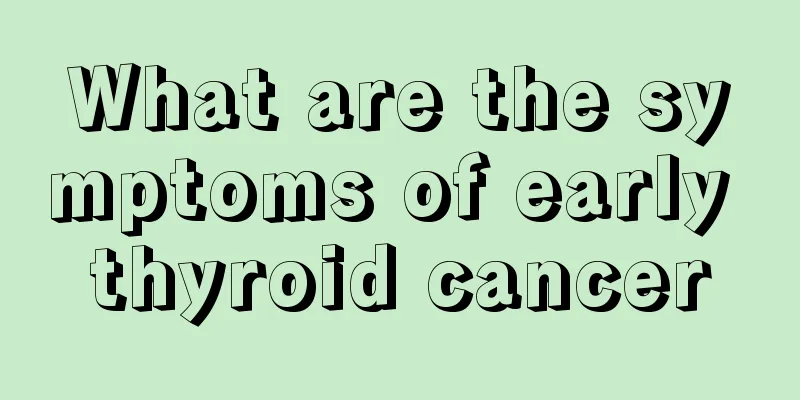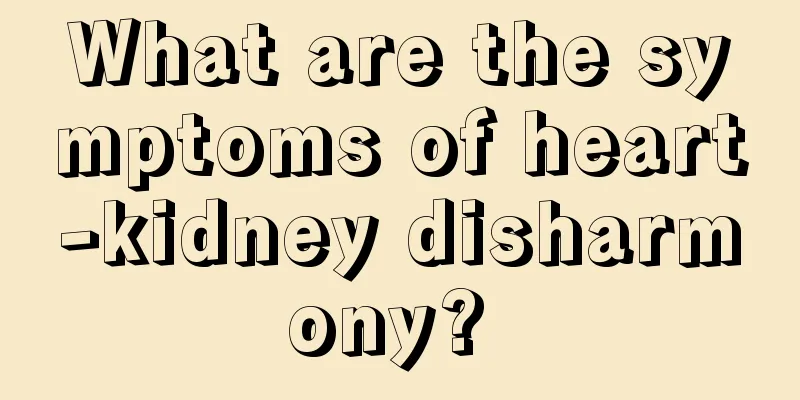What are the symptoms of early thyroid cancer

|
Early thyroid cancer should be treated as soon as possible. Common symptoms include neck lumps, hoarseness, and difficulty swallowing. Treatments include surgery, radiotherapy, and targeted drugs. Thyroid cancer may have no obvious symptoms in the early stages, but some patients will feel a painless lump in the neck. The lump is usually hard and can move up and down with swallowing. Hoarseness may be caused by tumor compression of the recurrent laryngeal nerve, while difficulty swallowing is caused by tumor enlargement compressing the esophagus. If these symptoms occur, it is recommended to seek medical attention in a timely manner for ultrasound, fine needle aspiration biopsy and other examinations to confirm the diagnosis. 1. Neck mass: The most common symptom of early thyroid cancer is a painless neck mass. The mass is usually hard, has unclear boundaries, and moves up and down with swallowing. If the mass grows rapidly or is fixed, be alert to the possibility of malignancy. Patients can check whether there is an abnormal mass in the neck by self-touch, and perform ultrasound examination for further confirmation if necessary. 2. Hoarseness: Thyroid cancer may compress or invade the recurrent laryngeal nerve, resulting in limited vocal cord movement and hoarseness. Hoarseness is usually gradual, and may manifest as a change in pitch in the early stages, and complete loss of voice in the later stages. If hoarseness persists for more than two weeks and there is no significant improvement, you should see a doctor as soon as possible to find out the cause. 3. Dysphagia: As the tumor grows, it may compress the esophagus, causing dysphagia. The patient may feel a sense of obstruction when food passes through the neck. The degree of dysphagia is related to the size and location of the tumor. In severe cases, it may affect normal eating. If dysphagia is accompanied by weight loss or malnutrition, you should seek medical attention for evaluation in a timely manner. The treatment of early thyroid cancer is mainly surgical, and the scope of resection includes the diseased thyroid tissue and surrounding lymph nodes that may be affected. After surgery, radiotherapy or targeted drug therapy can be selected according to the pathological results to reduce the risk of recurrence. Regular follow-up and thyroid function monitoring are important measures to prevent recurrence. Early detection and treatment are the key to improving the prognosis of thyroid cancer. It is recommended that those with related symptoms seek medical treatment as soon as possible and achieve long-term survival through standardized treatment. |
>>: Is congenital bile duct cyst scary?
Recommend
What are the methods to quickly remove formaldehyde?
As people's living environment in modern soci...
Should I use toothpaste to brush my teeth after having my wisdom teeth removed?
During the growth of wisdom teeth, if inflammatio...
How long will it take for the baby to be born if the coccyx hurts in the late pregnancy
During pregnancy, especially when you are about t...
Does doxolidine injection have any adverse reactions?
Doxolol for injection is mainly used to treat bro...
How big is a lung nodule to be considered early stage lung cancer
The diagnosis of early lung cancer is mainly perf...
How to hydrate hair
Hair also needs to be protected from the sun. Man...
Feeling dizzy after quitting smoking
Smoking is an indispensable part of many people&#...
How to quickly relieve allergic redness and swelling
Skin allergy is also called sensitive skin. From ...
How to prevent insect bites in summer
There are many things we need to pay attention to...
Why does moldy food cause liver cancer? Liver cancer patients should not eat too much of these foods
Many middle-aged people are about 40 years old. T...
What to do when eyestrain hurts? Computer addiction is to blame
Nowadays, people are constantly playing with mobi...
Can I get liver cancer if my liver is normal due to B-ultrasound? I found liver cancer after three tests
Liver cancer is highly malignant and patients oft...
10 bad habits
Introduction Due to different immune systems, som...
Tips to prevent hair loss that you need to know
Nowadays, with the increasing pressure of work an...
What to do if you have vomiting due to colorectal cancer
The morbidity and mortality rates of colorectal c...









